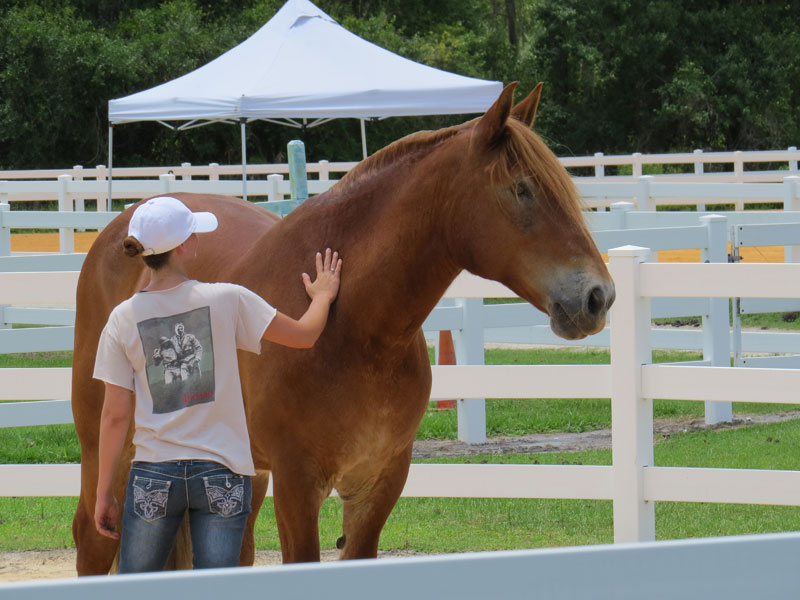
Every month, a group of military veterans travel from the Bay Pines Veterans’ Hospital in Tampa, Fla. to the Sarasota-Manatee Association for Riding Therapy (SMART) in Bradenton, Fla. for an equine-assisted therapy session. Some of the men and women who make the trip are grappling with post traumatic stress disorder (PTSD), others need help re-establishing home front relationships; all attend SMART’s day-long Warriors In Transition workshop hoping the horses will help them find peace.
“We’ve been doing this for the past six years and its always the same,” says Gail Clifton, SMART’s volunteer interim education program and facilities coordinator. “When the veterans get off the bus they’re skeptical, then they’re matched with the horses the magic happens.”
According to Clifton, between 8 and 15 military veterans are referred to the equine-assisted therapy program by the recreational therapist at Bay Pines every month. Each workshop session runs a full day – from 9:30 a.m., to 3:30 p.m. – and includes the supervised ground handling of a single horse contained in a round-pen. Horses used in the program range from Percherons and other Draft horses to ponies and miniatures; all are trained therapy animals. The majority of the veterans who take part in the program have never handled horses before, Clifton says.
The equine-assisted therapy workshop begins when each horse is matched with a veteran who is equipped with a long Dressage whip. The veterans are instructed never to hit the horse, but to point the whip at the horse’s feet if they want to animal to back away from its human handler. Over the course of the day, each veteran works on “inviting” the horse into his or her space with a goal of establishing a relationship with the animal, all the while recognizing how their behavior affects their relationships with other human beings.
“For example one woman got into the round pen, pointed the dressage whip at the pony’s feet and walked around the pony,” Clifton recalls. “After a while she came out of the round pen and wondered why the pony never approached her.”
According to Clifton, the woman was able to relate the experience with the pony to her failure to make human connections.
“She said, ‘That must be why when I walk into a room full of people, no one approaches me,’” Clifton says. “She just couldn’t see herself using her body language to keep those people away.”
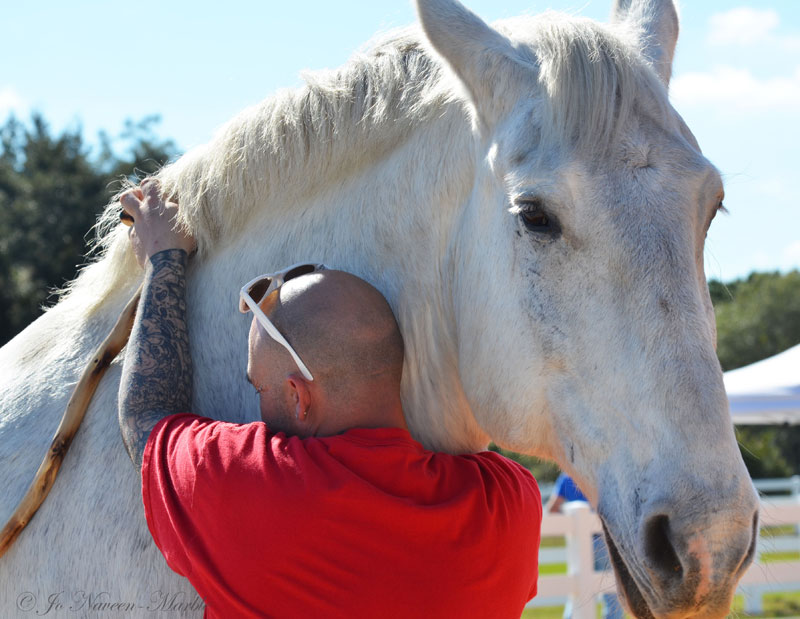
The story is typical, says Clifton. Most of the veterans to participate in the program begin the day keeping one another at arm’s length. By the session’s end, participants are hugging the horses and all laughing, even embracing one another.
“You’ll see these big, burly guys burying their faces in the horse’s neck just sobbing,” Says Clifton. “I don’t know how it happens, but it does; these horse are healers.”
The developer of the Warriors In Transition program believes he knows exactly why it happens.
A veteran of the Cold War Naval Intelligence Service, Terry Murray developed the Warriors In Transition program after studying the Epona Equestrian Services system of equine-assisted learning developed by founder Linda Kohanov. Murray believes that the Warriors In Transition program works because horses and veterans have a lot in common.
According to Murray, it takes the military just 8 weeks’ of basic training to strip recruits of their self-esteem and to replace it with so-called unit esteem – a kind of herd bonding. Later in the combat zone, soldiers on patrol are at high alert for long periods of time.
“They look for anything that doesn’t fit because it could be an IED (improvised explosive device) ,” Murray says. “They want to say alive.”
As a result, returning veterans often find it difficult to form bonds with friends, spouses and others who never went to war. At the same time, they deal with the nightmares and flashbacks associated with post traumatic stress.
“When you come back, you see people in a different way – people walking around in a level 3 awareness, while you’re walking around at a 10 awareness level,” he says. “People want you to function at a level 3 – it just doesn’t work.”
Murray says horses are particularly helpful in veterans’ equine-assisted therapy programs because horses and soldiers share a heightened sense of awareness and the desire to process information in order to protect the herd.
“Horses are hyper aware and very conscious that their awareness is information,” Murray says. “In every herd there is a watcher and one that is being watched – sometimes its a mare, sometimes it’s a stallion, but either way, it’s about doing what is best for the herd.”
According to Murray, the “magic happens” when veterans learn to see the dangers of their life experiences the way horses do.
“Horses use their awareness to see a threat, identify it, react to the threat and then go back to grazing,” Murray says “We help veterans do the same thing – acknowledge that the threat existed and then get back to their lives.”
At the same time, horses help mirror the way veterans behave around fellow human beings.
“You have to invite horses into your space,” Murray says. “If you don’t, they just don’t care – they keep just on grazing.”
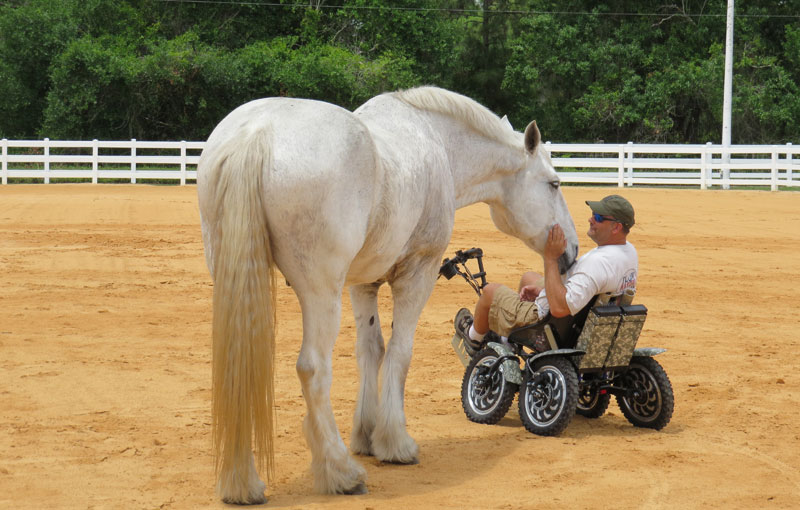
Finally, Murray says he developed the Warriors In Transition program to help veterans learn to bond and establish – or reestablish – their relationships with other human beings, but the program’s ultimate goal is to help veterans thrive when they return to their families and their communities.
“In this war, so many of the soldiers were reservists, and when they came home they were supposed to dissipate into the world without support,” Murray says. “It takes time to change the way veterans think about themselves and others, but the horses show them where to start.”

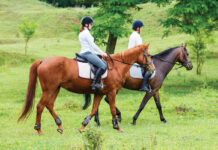
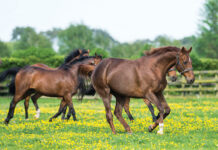
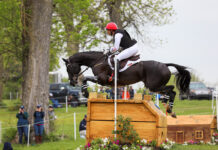

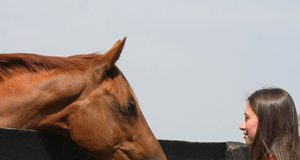
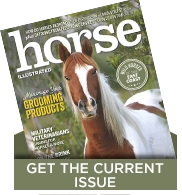
This an excellent article. I’ve never been to war and I have a cousin who has. He is a loner. This program could have changed is whole life. I’m so glad it’s helping others.
Horses and Heroes is a Reality TV series, which will help military personnel and veterans find a new way to cope with the physical and emotional challenges brought into their lives by war. Each season will focus on telling the stories of eight veterans as they go through Equine Therapy. Unlike most veteran based therapies, Equine Therapy does not involve drugs that only sedate symptoms, but never deal with the core issues. What it does do is help them find new ways to see and react to their emotional triggers. It helps their bodies remember how it used to work before it was injured. It can’t replace what was lost, but it can give them the confidence to see that they are more than the sum of their body parts. As each veteran shares her or his fears, pain, joy, and hope for the future, they will reach out into others’ homes and lives to give them the strength, courage, and hope they need to face their own physical and emotional challenges Additionally, Horses and Heroes will give those from previous wars, who never addressed their issues, the information and permission they need to go back and heal themselves forward.
http://www.youtube.com/watch?v=f_vdquPYXx4
Learn more by visiting our website
http://cproduction5.wix.com/cosmos-productions-#!page3/cee5
So nice.
I know my horse’s mane and neck are tear soaked and if it was a sponge, it would take years to ring out.
great info
horses are earth bound angels here to loan us their wings Bless the warriors and their mighty steeds
Bravo! what a wonderful program!, and horses are truly a mystical animal, they help humans in so many ways!, they help autistic children open up, and now the amazing souls that have fought to protect us are receiving invaluable therapy from horses!, and to think that many ignorant people consider horses a big dumb animal! when the truth is the exact opposite! so, bravo!, My heart swells to see that yet again horses prove just how wonderful they are!
I would love to start a program up like this at my farm I have 7 horses all needing love & attention too ! Would you know of anyone or would you be looking to set up in spring hill Florida ?
Where do I start to do this at my barn in Central IL
For more information you can visit http://www.pathintl.org and http://www.eagala.org and search for farms in your area.
Horses are amazing energetic creatures which can teach us so much about ourselves. Having a “relationship” with a horse forces us to become aware and accountable for what we bring into that relationship. If anyone is interested, or know anyone who may benefit from this experience, please check out Hoof Prints to Freedom on Facebook. It’s an amazing group who works with veterans.
I am so into horse therapy. I used to do it when I was younger with children. I do know how horses can help all people. They seem to cense the need to be close.
My oldest son has don 2 tours Iraq an 1 Afghanistan where he was injured. He had to heal at Ft. Riley for a year. During that healing time they put him on a list to go to horse therapy an it didn’t happen. I had prayed they would send him. He suffers from PTSD an had been attending classes at the VA in Topeka up until he had an issue an now he in jail. I wished he cudve have gotten into the horse therapy program during that time. I feel it wudve have helped an not to just utilize meds. I love this article & pray for those that come to this program. God Bless those that have sacrificed for this country
Not to be horsing around, but a good dog can do the same thing.
Great story. Too bad it wasn’t proofread before it was posted.
I have to say that these words resounded with me, as a rape survivor, it’s much the same:
“They look for anything that doesn’t fit “They want to say alive.”
find it difficult to form bonds with friends, spouses and others who never went to war. At the same time, they deal with the nightmares and flashbacks associated with post traumatic stress.
you see people in a different way – people walking around in a level 3 awareness, while you’re walking around at a 10 awareness level,” “People want you to function at a level 3 – it just doesn’t work.”
It’s much the same, and it was helpful to read these words, to make me understand why I feel the way I do. Thank you for this story.
Kim,
I rescued my first horse 6 yrs ago. Actually, we rescued each other in the long run. I was sexually abused at 5, then raped in the military. That was decades ago. I didn’t get help until I was 45, now I am 63. I finally got my first horse at 57, I kept begging my parents for a horse since I was 7. Yes, ‘the magic happened’. There was a heart bond between my horse and me. He ‘brought me home’ after so many years of being so distant, running from myself, not being able to stay in one place, one job for more than 18 months. Not understanding why?! Horses are wonderful creatures!! Unfortunately, we had to hug him good-bye 2 days before Christmas last year, because of his health. That was a terrible day in our lives. He helped me raise a young filly from 6 months to 3 1/2 yrs old. Now, I bought another gelding of the same breed as my first horse because I fell in love with him, I learned so live again because of him. Sure I still have PTSD, I still have problems, and now I also have a service dog 🙂 too! Never give up!!